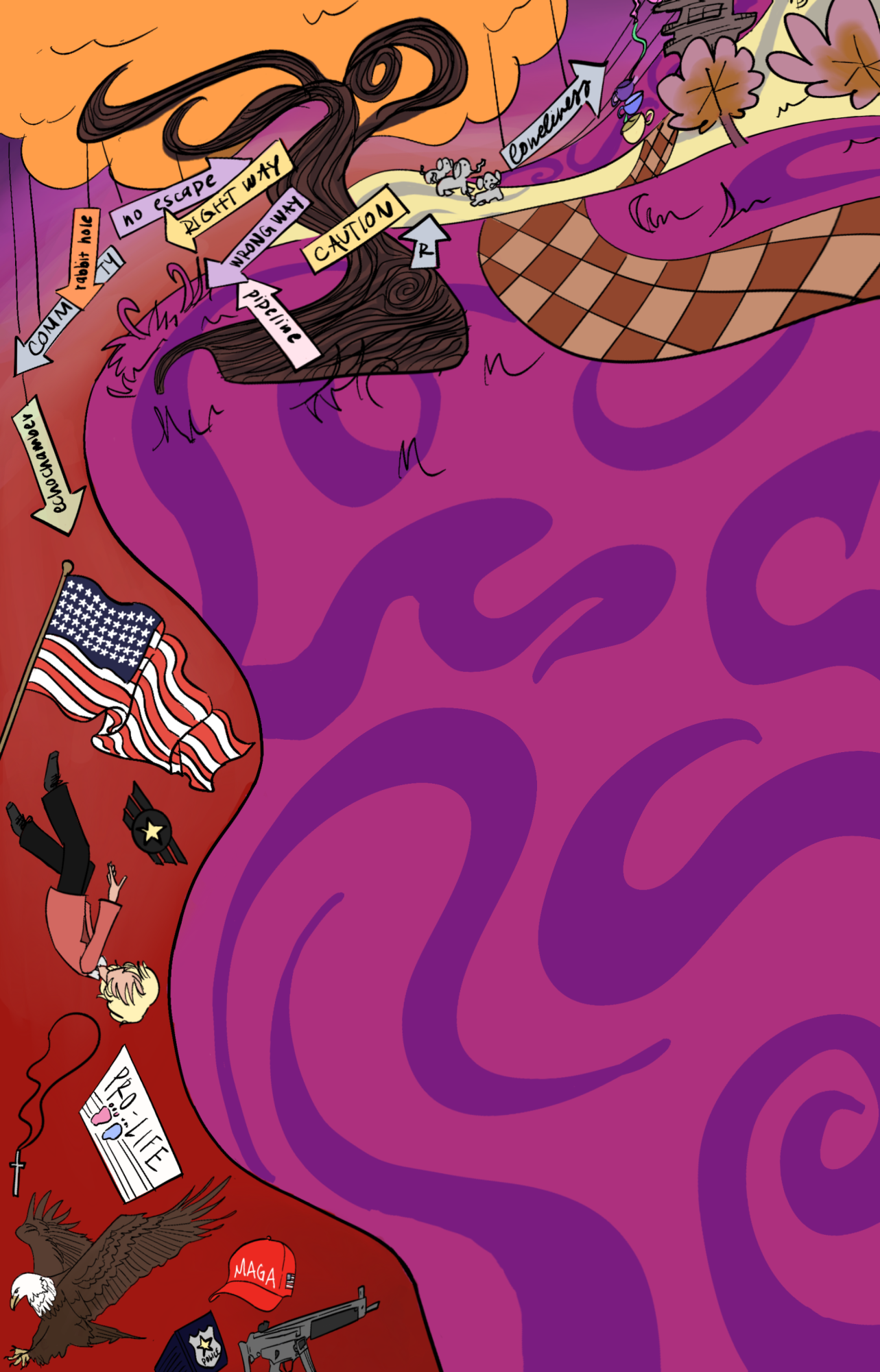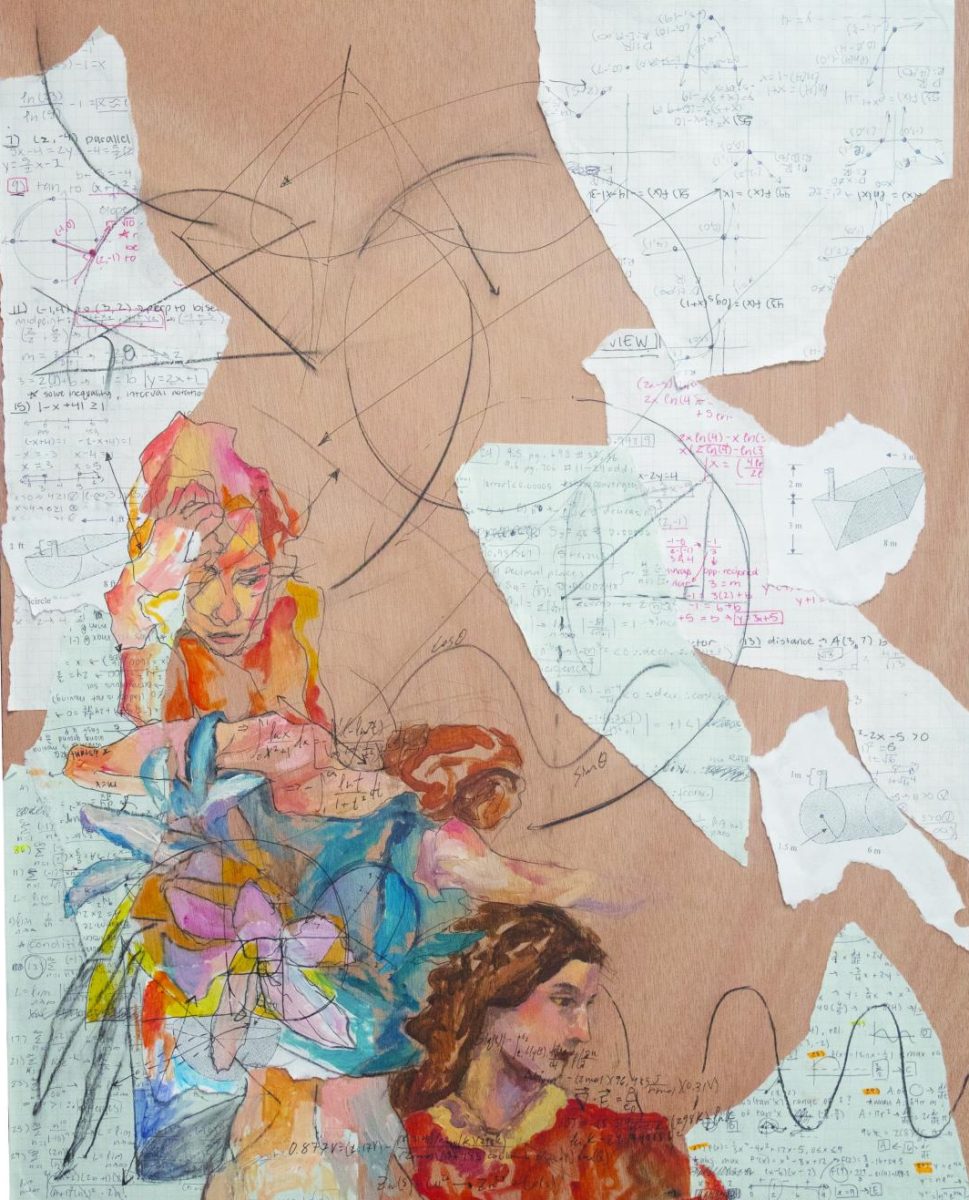Ethan Swifferland (10) tethers his beliefs to the image of American tradition. Often sporting a baseball cap branded with the American flag, Swifferland is staunchly pro-life, attends Sunday church services, is the only Catholic in his family, a firm believer in a free-market economy, deterred by feminism, and grounds his principles in family values. Despite growing up with Democrat parents, Swifferland identifies as a conservative Republican. But just two years ago, his political alignment fell nearly on the complete opposite side of the spectrum, previously identifying as a democratic socialist.
In the last presidential election cycle, Associated Press News reported “Young men swung to the right for Trump after a campaign dominated by masculine appeals,” revealing more than half of men under the age of 30 supported Trump. CBC News concluded “They’re young, male, and swinging conservative,” and The Wall Street Journal wrote “Why So Many Young Men Are Turning Republican Now.” Nationwide, young men have been moving further and further right on the political spectrum since Trump first won the presidency in 2016.
For Swifferland, the appeal of conservatism fully captured him after seeing how Democrats handled the economy and foreign policy in the Biden administration. However, Swifferland said this transition was also supplemented by anti-feminist sentiments.
“The anti-feminist stuff was definitely appealing to me,” he said. “I believe the law should recognize rights on a gender-blind status generally. I was sympathetic to the feminist movement for a while, but I started to shift away [because] when it comes to society, we have to recognize differences between men and women. This includes allowing men to have spaces only to men and women to only women. Feminism also pushed the message of ‘empowerment’ which has largely translated into hyper-sexualization of society.”
Swifferland eventually began moving toward right-wing content and away from left-wing media, from liberal podcasts to conservative news outlets, trading Pod Save America for The Daily Wire.
According to Stanford Graduate Fellow and PhD candidate in Communication Becca Lewis, who researches disinformation and far-right digital media, adolescents are particularly prone to changing their political identity.
“It’s very common for young adults [to] grow up [with] parents telling you one thing, and as you grow into adulthood, having to figure out what your own politics are,” Lewis said. “It’s a moment in time, high school and college, meant for trying new ideas and seeing, ‘What do I believe? Do I believe the same things as my family? Do I not?’”
Lewis said much of right-wing media have taken advantage of this developmental period.
“It’s important to note that right-wing media creators have been incredibly savvy at [marketing] towards people in that stage of experimentation,” she said. “They’re good at framing themselves as rebellious and positioning themselves as countercultural. Any of these things help position them to people curious to test the boundaries of where they actually stand.”
As a young boy, Caleb* had a million and one things to discover for himself — what sports he liked, what his favorite color was, what toys he wanted to play with. But growing up, political beliefs were not found but inherited, beliefs he now opposes.
“It’s different growing up in a military family,” Caleb said. “The people that I was surrounded with [had a] heavier stance on being more conservative and right-leaning. The narrative we were told when we were younger was that liberals do not support the military. I didn’t really process that when I was young, but it played into my belief system before I knew what politics were.”
As Caleb grew up and found himself in male-dominated environments like sports teams, he noticed how he and his peers began attaching their masculinity to conservatism.
“What I started to see when I got into middle school and started hitting puberty is that teenage boys want to become a man so fast, [they] try to prove themselves as a man,” he said. “In male-dominated sports, you would see young men influenced by this a lot. For me, mine was football, 100%. People would pressure others into agreeing with them or socially ostracize [others], excluding people out of conversations, name-calling. Especially around election time, it [became about] whether you were a die-hard trump supporter or not. It becomes a toxic environment when you start testing people’s masculinity with it.”
According to Lewis, defining masculinity and men’s roles in society has been a decades-long issue catalyzed by the rise of the feminist movement. When this issue festers in typically male-dominated spaces like sports, technology, cars Lewis said the space can easily start adopting conservative views.
“There’s been a ‘crisis of masculinity,’ that’s existed in American society ever since the rise of, particularly second wave, feminism in the 1960s and 1970s,” Lewis said. “There’s a question of what does it mean to be a man, to have masculinity, what is masculinity, and that has never really been resolved. People have projected different images of what they think masculinity is, but it’s very much up for grabs. [Male] spaces are constructed around trying to formulate a very traditional idea of what masculinity is for people to follow, [which] can be a valid model, but it also can be very limiting and can quickly become conservative or right-wing.”
Caleb said that the pipeline of conservatism often starts simply in the typical interests, likes and dislikes of young men.
“It [may] start with, ‘I’m a man, guns are cool, I like the 2nd Amendment,’” he said. “You fall down this rabbit hole of finding people who believe in things you’re interested in. Then, they start saying their beliefs before you’re able to put your own thoughts on it. [Young boys’] minds are so moldable, so impressionable. You find things you’re interested in, then you find a political divide and you go down the one that supports your interests.”
Lewis said young mens’ difficulty to form identities works in tandem with the loneliness epidemic.
“In general, the pandemic, an increase in work-from-home [jobs], all these things have led to a sense of isolation more broadly across society,” she said. “When you mix that with the crisis of masculinity, men can feel in crisis when they don’t have a sense of community. And when there is community among men, it can often be this very limited view of what masculinity is.”
In Swifferland’s eyes, the family values aspect of conservatism is necessary in grounding people to reality.
“I fully buy into the idea that [the priority] is God, family, country,” he said. “Without God, I don’t think we’d be alive to begin with. Without family, you don’t have a country because a family is what ties you to reality, to society and to reason. If you’re not tied to society, you’re not tied down to reality, then you’re going to get into degeneracy.”
When it comes to family values, Lewis said these conservative principles reaffirm the roles of young men in society.
“The crisis of masculinity in the ’70s emerged because second-wave feminists [advocated for] more women in the workplace, breaking this nuclear family structure,” Lewis said. “A lot of men said, ‘We have to re-establish family as the nucleus of society, bring back the male breadwinner, the female homemaker.’ In 1950s advertisements, it’s all happy families and that can be an appealing mythos. It promises a built-in solution to loneliness, it means that a young man doesn’t have to challenge his roles at the head of a unit. It also taps into that sense of resentment the manosphere talks about, which is, ‘If women don’t want to date me, that’s a problem with women. It’s a problem with gender relations.’”
When Swifferland began aligning himself with the Republican Party and conservatism, he said it was around the same time he converted to Catholicism through the Bible and researching philosophical ideas that mandated the existence of God. Being the only Catholic in his non-religious family, Swifferland said there was some initial pushback from his father, but eventually, he started attending church regularly. Swifferland said that church has been a different, but positive, force in his life.
“The church community is very different from my community,” he said. “With the religious community it’s a lot deeper. It’s philosophical, it’s moral. [Religion has] made me a bit more conservative and it’s shifted my social views more conservative too.”
Swifferland’s case isn’t a unique one. Overall, The New York Times reported “With Gen Z, Men Are Now More Religious Than Women.” According to Lewis, religion and conservatism often go hand in hand.
“For big parts of the right wing, religion is really a central force,” she said. “In America, it’s overwhelmingly Christian conservatism that is a particular interpretation of Christianity that suggests, for example, God made men and women fundamentally different and men are supposed to be the ones going out to work and women staying home. That’s one way of interpreting the world through Christianity that aligns with conservative values. It’s not to say every conservative is Christian. Someone like Ben Shapiro, who’s Jewish, it’s really interesting to see the number of his followers and people he works with who are Christian. Even though they have different religions, they’re still adhering to this more culturally conservative worldview that aligns with multiple religions.”
For Swifferland, this epidemic is mainly fueled by gender divides in politics and an unraveling of family structure.
“I think the loneliness epidemic comes from it being harder for a conservative man to find a conservative woman,” he said. “The political divide is big. Men are going for the traditional family, but women are obviously going more liberal. The woman is the homemaker, the man goes to work, comes home, you have a big happy family. When you have people who [want to] have a family, but are not able to find a woman, they’re not able to start a family. That starts to depress them over time.”
Caleb said that he’s seen this issue tied with a lack of male role models in young men’s lives.
“A lot of us young men look up to dads and grandparents,” he said. “[But] their ability to change or willingness to change is not the way ours is right now. Those male role models, they’re successful, they’re loving. But then you see they believe in these right-wing [beliefs], so I must do the same. There’s a lack of male role models who separate themselves from what most men in, not just the past, but young men in today’s generation start to believe in. It’s an endless cycle over and over again. What my grandpa believed in is the same thing that my dad believes in. If I was to continue going down that same way, it’s the same thing.”
Lewis said many young men also end up looking towards popular media for role models.
“Part of the challenge is that in this creator ecosystem, you get a swath of different creators who are presenting themselves as these male role models to get the most clicks, the most views,” she said. “The incentive structure for how to get the most clicks and views doesn’t always align with what makes for a good role model. So it’s people that are willing to prize entertainment value, yet those are the people that are easiest to stumble upon as a young man because they’re getting the most views.”
Although Swifferland considers his dad to be his greatest role model, he agreed that male figures in right-wing media have also led to the rise of conservatism. JD Vance’s story, for one, particularly resonated with him.
“Now you’re seeing much more [public] male role models like Joe Rogan,” he said. “I like JD Vance. He grew up in a household where his mother was an alcoholic, then he goes to Yale, serves our country in the Marines, becomes a senator and then Vice President. It’s a strong story and it’s really inspiring how strong he is today. Being able to move from [being] poor to the Vice President of the U.S. is a testament to the American dream and an attitude I want to carry on into my life because we should all strive for success.”
As right-wing public figures have become more synonymous with male role models, Lewis said classic American mythos like the American dream can resonate with many young men.
“When you look at the data, there’s not socioeconomic mobility in the way the American dream suggests, but the American dream is an incredibly powerful story and mythos,” Lewis said. “In political propaganda, or political media in general, mythology, not in terms of things that are necessarily false, but things that tap into these shared ideas about the world, can be an incredibly powerful way to get across ideas. We all want the American dream to be true. It resonates with us. You will see, a lot of times in these far-right channels, an appeal to these shared American mythologies as well as these ideas known as common sense ideas.”
For a long time, Caleb played into the ideologies that were fed to him, generally staying out of politics simply because it was easier that way. Now in his senior year, it wasn’t until he took the AP U.S. Government that he became more engaged.
“[I started] actually learning about how the government functions and different ways of believing things and how people [are] politically socialized. It just happened to be right about the time I turned 18 before the election, and I kept getting pressured to answer who I was voting for. [I started] researching and finding out what I believe in. Once you have the ability to voice change in your government that you want to see, that’s when you start finding your true beliefs. But that genuinely has to come from education, otherwise you’re just voting off of a whim.”
Tufts’ CIRCLE found that approximately 42% of young voters voted in the last presidential election. With more young people disengaging from politics, Caleb said that indifference, as much as it is passive, can be dangerous.
“Indifference is dangerous in that you give power to the people who have been engaged in this longer than you have,” he said. “Old people vote a lot more than young people statistically and most of them are more conservative. I wanted to stay out of it for a long time, but the idea of, ‘It doesn’t affect me, why should I care?’ is self-centered, and that’s how young men are in the beginning. Every young boy wants to be a superhero and help people. Being able to do that through your voice in politics is something we need to start thinking about.”
For Caleb, education didn’t just open his eyes to new perspectives, it empowered him.
“Our world’s changed,” he said. “A lot of people who were my friends, a lot of people who are my friends start falling into these dated narratives. [Having] the opportunity to learn about different issues, the different stances on issues, what [I] personally believe in, that was very empowering for me]. The fact that I was given the opportunity to learn in an unbiased manner allowed me to make an informed decision on what I believe in instead of feeling pressured into something. It made me feel more of my person. I know who I am and what I stand behind.”
*Names changed









